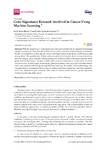Gene Signatures Research Involved in Cancer Using Machine Learning

Use this link to cite
http://hdl.handle.net/2183/23937Collections
- Investigación (FIC) [1684]
Metadata
Show full item recordTitle
Gene Signatures Research Involved in Cancer Using Machine LearningDate
2019Citation
Liñares-Blanco, J.; Fernandez-Lozano, C. Gene Signatures Research Involved in Cancer Using Machine Learning. Proceedings 2019, 21, 19.
Abstract
[Abstract] With the cheapening of mass sequencing techniques and the rise of computer technologies, capable of analyzing a huge amount of data, it is necessary nowadays that both branches mutually benefit. Transcriptomics, in this case, is a branch of biology focused on the study of mRNA molecules, among others. The quantification of these molecules gives us information about the expression that a gene is having at a given moment. Having information on the expression of the approximately 20,000 genes harbored by human beings is a really useful source of information for the study of certain conditions and/or pathologies. In this work, patient expression -omic data data have been used to offer a new analysis methodology through Machine Learning. The results of this methodology were compared with a conventional methodology to observe how they differed and how they resembled each other. These techniques, therefore, offer a new mechanism for the search of genetic signatures involved, in this case, with cancer.
Keywords
Machine learning
Cancer
Transcriptomics
TCGA
RNA-Seq
Cancer
Transcriptomics
TCGA
RNA-Seq
Editor version
Rights
Atribución 3.0 España
ISSN
2504-3900






